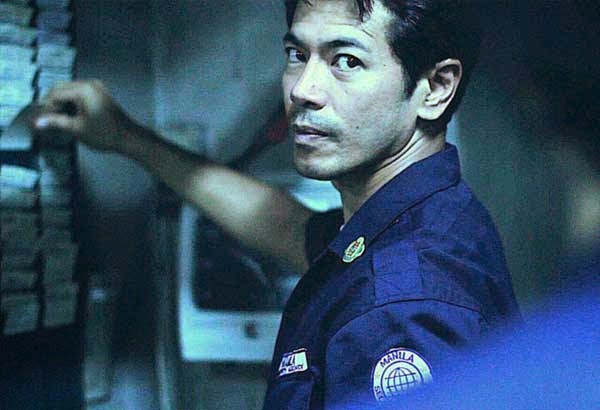The Budapest.
Fresh off the success of his pre-adolescent love story that is
"Moonrise Kingdom", Wes Anderson is back, after a mere 2 years, for
"The Grand Budapest Hotel", a film that is as deeply troubling as a
penny dreadful yet as deft in its storytelling as a great piece of literature.
It is also particularly notable for having in its disposal a wide array of
well-known actors, no matter how out of place some of them may ostensibly be in
a Wes Anderson picture, that figure perfectly
into this otherwise odd little film.
For almost every single one of the esteemed filmmaker's niche fan, this project
is undoubtedly a great step towards the right direction because Anderson
finally ventures into a genre that is yet to be tread by his cinematic shtick.
If almost all of his previous films deal largely with the dysfunctions of
certain families and how they affect the already idiosyncratic world they live
in, "The Grand Budapest Hotel" adversely creates a vast, "Dr.
Zhivago-like" dreamland of quirks and unexpected politics that seem to
overwhelm the main characters in ways both good and bad. Reminiscent of Charles
Chaplin and how he has specifically concocted fictitious nations that mirror
real countries (Tomainia as Germany and Bacteria as Italy) for his dim-witted
dictators to rule over in "The Great Dictator", Wes Anderson has
created the Republic of Zubrowka: the place where the titular hotel is
situated. Run by the charismatic, well-mannered, and overly cordial Gustave H
(Ralph Fiennes) and assisted by the 'divine' lobby boy named Zero (Tony
Revolori), the hotel, as lavish as it is, is shown as something that's kept
alive not just by the quantity of rich guests that flock it, but also by the
odd kind of discipline Gustave indoctrinates to his subordinates. It is also
quite in order to mention that Gustave consistently engages in sleazy friendships
with "rich, old, insecure, vain, superficial, and blonde"
women, which makes his job all the more financially rewarding.
For Wes Anderson purists, watching "The Grand Budapest Hotel"
is a gratifying experience, and even that, for some, is an understatement. With
his visual symmetry evidently at its most impressive in this film and his
deadpan humor now deliciously lined with some hints of classic slapstick and shocking
violence, he has admittedly upped the ante. Because of how Anderson has
slightly altered his game for this film while tackling themes previously
unfamiliar to him (murder, wartime politics, and the likes), he has made genre
archetypes conform to his patented aesthetics and not the other way around, and
that, at least from where I see it, is a mark of a true auteur.
On the other hand, though, for film fans that are slowly getting quite
irate of Wes Anderson's gimmicky style, "The Grand Budapest Hotel"
may very well sound the death knell for any chance of them being endeared to
his future works. Abundant and almost abusive in its use of tableaux,
intentional lack of comic timing, and self-conscious clichés, the film can very
well turn people away because Wes Anderson's deadpan approach to filmmaking is
at is final, most unbreakable form here. In "Rushmore", it's quite
obvious that he's still unsure if what he's making is a coming-of-age dramedy
or a romantic comedy. In "The Royal Tenenbaums" and even "The
Darjeeling Limited", the emotions are still that of a traditional indie crowd-pleaser.
Even the "Fantastic Mr. Fox" is still a children's movie in every
sense. But here in "The Grand Budapest Hotel, Wes Anderson seems to care lesser
about what people may say about it or whether or not it defies genre
classification. There are moments where vignettes are used in awkward ways while
there are also scenes where movements are obviously sped up (perhaps to channel
comedy pictures from the silent era). Also, he is quite unapologetic in using
artificial-looking backdrops to reinforce the film's cartoonish appeal, which unfamiliar viewers may perceive as utterly phony or just plain indulgent. But on the upside,
the film's screenplay is clever, fast-witted, and absurdly hysterical, which is
the primary reason why Wes Anderson is still quite a darling among film critics
despite the fact that he often inspires polarizing sentiments among cinephiles.
As for the performances, Raph Fiennes may have just punched his ticket
for a trip to Dolby Theatre for his scene-stealing yet completely effortless
turn as Gustave H, while the all-star cast never faltered in providing the film
some energy to convince us to be part of the almost magical realist world of
Zubrowka for less than 2 hours, and also the ample wit in delivering seemingly archaic lines in sarcastic ways that miraculously make them seem very much
refreshing.
Reality check: "The Grand Budapest Hotel" may not be Wes
Anderson's best work (though it's really, really close), but it's definitely
the most entertaining, what with its chase sequences, all that Willem Dafoe
moments, plus that specific (at least for me) "Holy shit, is that Jeff
Goldblum?!" scene. Though its wartime setting may put off some fans
who have grown accustomed to Wes Anderson films that are typically smaller in scale
and centered on a particular family's collective troubles, this film is a peek into how great Wes Anderson can be if he tries out things and themes
that are on the opposite side of his comfort zone. There's something in this
film which really suggests that Wes Anderson, despite the fact that he will no
doubt live and die by his trademark aesthetics, is in for a certain reinvention,
storytelling-wise. Indeed, I am sold; sold to this man who was once only
seemingly concerned in featuring the Futura font and some gramophones in his films
but is now adventurous enough to take on murder, war, and politics and make
them seem laughable instead of distressing. It's a 'grand' illusion, what he
has created here.
FINAL RATING














.jpg)

.jpg)

